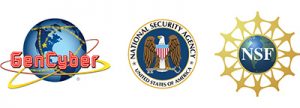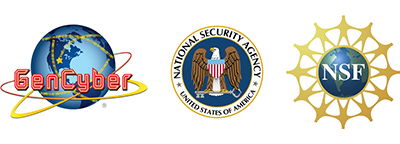
Apply now for Michigan Tech’s 2021-22 cohort of Cybersecurity Scholars and jumpstart your cybersecurity career!
The deadline to apply is June 1, 2021.
This generous scholarship opportunity provides up to three years of tuition and annual stipend.
Then, following completion of your degree, you’ll work in a cybersecurity-related position for a federal, state, local, or tribal agency for up to three years– a period equal to the length of your scholarship.
See full guidelines, requirements, and application information on the SFS website: mtu.edu/sfs.
Eligible Degree Programs
- BS in Cybersecurity (CyS)
- BS in Computer Network and System Administration (CNSA)
- BS in Computer Science (CS)
- BS in Software Engineering (SE)
- BS in Computer Engineering (CpE)
- BS in Electrical Engineering (EE)
- BS in Management Information Systems (MIS)
- MS in Cybersecurity
Ready to apply? Visit mtu.edu/sfs
Questions? Email sfs@mtu.edu
Or Contact: Project PI Profesor Yu Cai, or any key faculty member: Professor Jean Mayo, Professor Todd O. Arney, Professor Bo Chen, Professor Chee-Wooi Ten, Professor Kedmon N. Hungwe, and Dr. Laura Kasson Fiss.
The Michigan Tech SFS Program
The SFS program at Michigan Tech involves multiple programs and departments, including the College of Computing and its departments of Applied Computing and Computer Science; the College of Engineering’s Department of Electrical and Computer Engineering; and the College of Business’s Management Information Systems B.S. program.
“The U.S. is facing a significant shortage of well-trained and well-prepared cybersecurity professionals,” said Dr. Yu Cai, professor of applied computing and the principal investigator of the grant. “This new scholarship will continue to develop Michigan Tech’s national and international reputation as a leader and innovator in cybersecurity education, research and outreach activities.”
The five-year, $3.3 million NSF grant provides up to three years of full scholarship support for 20 Michigan Tech undergraduate and graduate students.
About the NSF Scholarship
Protecting worldwide digital infrastructure has become an urgent focus of industry and government. And employment in this sector is expected to grow exponentially in the coming years.
In response, the National Science Foundation CyberCorps: Scholarship for Service (SFS) program was introduced as a nationwide program to recruit and train the next generation of information technology professionals, industrial control system security professionals, and security managers.
by Yu Cai, College of Computing
A GenCyber Cybersecurity Teacher Camp for K-12 teachers will be held at Michigan Tech during the week of July 19 – 23. Participants will learn cyber hygiene and fundamental security knowledge including email phishing, password management, and cyber ethics. Participants will also learn how to develop lesson plans to teach cybersecurity in K-12.
This is a residential camp (commuting optional), and is offered at NO COST to all participants. Room and board is included. Each teacher participant will receive a stipend of $500 for attending and completing camp activities. Camp activities will count for 25 State Continuing Education Clock Hours (SCECH).
Click here for more information and to apply. The application deadline is May.
Funding for the camp is provided jointly by the National Security Agency (NSA) and the National Science Foundation (NSF) through an award led by Yu Cai and Tim Van Wagner from the College of Computing.

Professor Yu Cai, Applied Computing, a member of the ICC’s Center for Cybersecurity, is the principal investigator on a two-year project that has received a $99,942 grant from the National Security Agency (GenCyber). The project is titled, “GenCyber Teacher Camp at Michigan Tech. ”
Lecturer Tim Van Wagner (AC) and Assistant Professor Bo Chen (CS, DataS) are Co-PIs. Cai will serve as the camp director, Tim Van Wagner as lead instructor.
This GenCyber project aims to host a week-long, residential summer camp for twenty K-12 STEM teachers in 2021 at Michigan Tech. Target educators are primarily from Michigan and surrounding states.

The objectives of the camp are to teach cybersecurity knowledge and safe online behavior, develop innovative teaching methods for delivering cybersecurity content, and provide professional development opportunities so participants will return to their home schools with contagious enthusiasm about teaching cybersecurity.
The GenCyber camp will be offered at no cost to camp participants. Room and board will be provided. Teacher participants will receive a stipend of $500 for attending and completing camp activities.
Read about the 2019 Michigan Tech GenCyber camps for teachers and students here.
 Michigan Tech hosted two week-long GenCyber camps this summer. The first, held June 17–21, 2019, hosted 30 local middle/high school students. The second camp, August 12–16, 2019, hosted 21 local K-12 teachers. Camp participants gained cybersecurity knowledge, understood correct and safe online behavior, and explored ways to deliver cybersecurity content in K-12 curricula.
Michigan Tech hosted two week-long GenCyber camps this summer. The first, held June 17–21, 2019, hosted 30 local middle/high school students. The second camp, August 12–16, 2019, hosted 21 local K-12 teachers. Camp participants gained cybersecurity knowledge, understood correct and safe online behavior, and explored ways to deliver cybersecurity content in K-12 curricula.
A story about the GenCyber teacher camp was reported on August 16, 2019, by TV6: “GenCyber cyber security training camp comes to Michigan Tech” and on August 13, 2019, by the Keweenaw Report: “Teachers Learn How To Include Cybersecurity In Their Lessons.”
Learn more about the camps on the Institute of Computing and Cybersystems blog: https://blogs.mtu.edu/icc/2019/06/04/inspiring-the-next-generation-of-cyber-stars-2/.

 By Karen S. Johnson, ICC Communications Director
By Karen S. Johnson, ICC Communications Director
We live in a world where pretty much everything and everybody – individuals, companies, governments, critical infrastructure – are increasingly dependent on connected systems, networks and devices. And, as newspaper headlines reveal, those systems may be insecure and vulnerable to hackers.
“Nowadays, everybody is using computers, and more and more things are connected. That provides convenience, flexibility, a lot of great things, but it also opens the doors for hackers,” says Yu Cai, associate professor and program chair for the Computer Network and System Administration program at Michigan Technological University.
“The world has increasingly become a combination of the physical world and the cyber world,” Cai adds. “That’s why cybersecurity is important, because you want to protect yourself. As human beings, we evolved over thousands of years to take care of our security in the physical world. But in the cyber world, many don’t have a very good idea of how to protect themselves.”
Cai is principal investigator on two grant awards, each for about $85K, which are making possible two free, non-residential, week-long GenCyber summer camps on Michigan Tech’s campus. The first camp, for middle school and high school students, is the week of June 17. The second camp, for K-12 STEM teachers, is the week of August 12. Both camps and all learning materials are offered at no cost to camp participants. Each participant will receive a Raspberry Pi minicomputer. Breakfast and lunch are provided. For enrollment information, visit mtu.edu/gencyber.
Funded jointly by the National Security Agency (NSA) and the National Science Foundation (NSF), the goals of the nationwide GenCyber program are to increase interest in cybersecurity careers and diversity in the national cybersecurity workforce, help students understand correct and safe on-line behavior and how they can be good digital citizens, and improve teaching methods for delivery of cybersecurity content in K-12 curricula.
“This is part of our picture to make Michigan Tech a leader in cybersecurity research and education,” Cai says of this summer’s GenCyber camps. “We have other cybersecurity curriculum development grants that focus on college education, now we want to outreach to K through 12.”
In both camp sessions, participants will explore the world of cybersecurity through real-world case studies, hands-on learning activities and games, interactive lectures, career exploration, and field trips. Covered topics include safe online behavior, cyber ethics, fundamental computer and network knowledge, and cybersecurity career options and educational opportunities.
“We’ll also cover common vulnerabilities and weaknesses of computer systems, such as how hackers get into the systems, and how systems can be strengthened to defeat hackers against the hundreds of vulnerabilities,” Cai adds.
Tim Van Wagner, a lecturer at Michigan Tech and a co-PI on the grants, is the lead teacher for the camps. Cai and his other co-PIs—associate professor Guy Hembroff and assistant professor Bo Chen—will also present learning modules and assist with the camps.
K-12 pedagogical expertise in curriculum development was provided by Copper Country Intermediate School District (CCISD) staff members Emily Gochis, Director of the Region 16 MiSTEM Network, and Steve Kass, Educational Technologist.
“Steve and Emily provided a lot of input and suggestions regarding the camp curriculum and advised us in the best practices for teaching high school students,” Cai says, adding that they are also helping to promote the camps in local public schools.
Driving the curriculum are four principles: Learning by Storytelling, Learning by Doing, Learning by Gaming, and Learning by Teaching. Cai and his team will be assessing the effectiveness of these principles using several methods. The resulting research will be shared with the GenCyber program and the public.
The two grants are titled, “Innovative GenCyber Learning Experience for K-12 Teachers Through Storytelling + Teaching + Gaming + Doing” and “Innovative GenCyber Learning Experience for High School Students Through Storytelling + Teaching + Gaming + Doing.”
 Yu Cai (TTEC/ICC) is Principal Investigator on a project that has received a $82,416 Other Sponsored Activities Grant from the National Security Agency/National Science Foundation. The one-year project is titled, “Innovation GenCyber Learning Experience for High School Students Through Storytelling + Teaching + Gaming + Doing.” Bo Chen (SCS), Guy Hembroff (TTEC), and Tim Van Wagner (TTEC), are co-PIs.
Yu Cai (TTEC/ICC) is Principal Investigator on a project that has received a $82,416 Other Sponsored Activities Grant from the National Security Agency/National Science Foundation. The one-year project is titled, “Innovation GenCyber Learning Experience for High School Students Through Storytelling + Teaching + Gaming + Doing.” Bo Chen (SCS), Guy Hembroff (TTEC), and Tim Van Wagner (TTEC), are co-PIs.